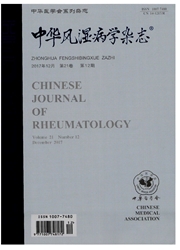

 中文摘要:
中文摘要:
目的探讨系统性红斑狼疮(SLE)患者外周血调节性T淋巴细胞F0xD3 mRNA和转化生长因子(TGF)-β1的水平与SLE病情活动的关系。方法对SLE患者采用实时定量聚合酶链反应(PCR)检测外周血单个核细胞Foxp3 mRNA的表达。对病情活动组患者进行随访.在疾病稳定期再次检测Foxp3 mRNA水平并用酶联免疫吸附试验(ELISA)检测疾病缓解前后血浆TGF-β1的浓度。结果病情活动组Foxp3 mRNA水平明显低于非活动组(P〈0.01)和健康对照组(P〈0.01)。在疾病稳定期Foxp3mRNA水平和血浆TGF—β1浓度较活动期明显升高。结论Foxp3表达及TGF—β1浓度与SLE疾病活动呈负相关,提示调节性T淋巴细胞在SLE发病中有重要作用。
 英文摘要:
英文摘要:
Objective To clarify the relation between the expression of Foxp3 in peripheral blood and plasma transforming growth factor betal (TGF-β1) and the activity of systemic lupus erythematosus (SLE). Methods Foxp3 mRNA expression of 28 active SLE patients, 13 inactive SLE patients and 16 healthy controls was determined by poiymerase chain reaction. Active SLE patients were followed up; Foxp3 mRNA expression of 20 active patients was measured in the stable status and the plasma TGF-β1 was measured by ELISA in the active and stable status. Results The active SLE patients showed reduced levels of Foxp3 mRNA than the inactive SLE patients (P〈0.01) and the healthy controls(P〈0.01 ). Expression of Foxp3 mRNA and the plasma level of TGF-β1 in 20 SLE patients were both higher in stable status than in active status. Conclusion The expressions of Foxp3 mRNA in peripheral blood and TGF-β1 in plasma has significant inverse corelation with disease activity, which suggests that regulatory T cells may play an important role in the pathogenesis of SLE.
 同期刊论文项目
同期刊论文项目
 同项目期刊论文
同项目期刊论文
 期刊信息
期刊信息
